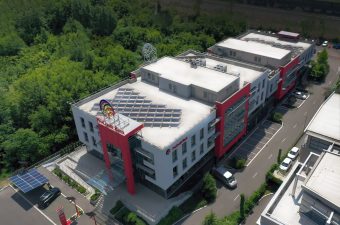
The circular economy puts an end to the concept of “exploit – produce – use – throw away”. As it usually happens, we became aware of climate change, the incredible amount of waste surrounding us and the terrible pollution only when the situation became alarming. The circular economy’s mission is to rethink what waste is and whether waste can be further used as raw material. But the circular economy does not stop there – it insists on the systematic application of the so-called 3R principles – recycle, reuse, and reduce the use of resources. The circular economy is the answer to the call to think, pay attention to our surroundings and realize that we must use resources more rationally.
Circular economy in the banking sector
“It is probably too early to assess the banking sector’s role in implementing the circular economy in Serbia. Progress toward sustainable business and the implementation of ESG standards certainly exists. However, the transition to the circular economy will be demanding and long-lasting. We at ProCredit Bank believe that we will motivate companies to invest in environmentally responsible and sustainable business through more attractive financing conditions for green projects and by personal example,” said Dragan Reščik, Head of the HR and Marketing Department at ProCredit Bank.
In cooperation with the GEFF, ProCredit Bank offers up to 20 per cent refund of funds spent on green projects. Still, at the same time, it is guided by a list of excluded activities, and by the estimated impact on the environment and sustainable development, it carefully selects the projects it finances. Furthermore, ProCredit advisors provide a full set of services for business clients. Through continuous training, they are fit to be advisors to companies in the truest sense of the word and offer solutions for boosting energy efficiency according to the client’s business model.
IN FOCUS:
- EMPOWERING LOCAL COMMUNITIES – PANEL BY PANEL TO POWER PLANT
- SUSTAINABLE BUSINESS FOR REDUCING THE ENVIRONMENTAL FOOTPRINT
- TOP PRODUCT QUALITY AS A GUARANTEE OF INVESTMENT SECURITY
“Green energy and responsible management of resources are, unfortunately, not the cheapest option in the short term. However, their long-term return and social importance compensate and greatly exceed the investment. With expertise, an individual approach and many years of experience, our advisors have managed to empower clients to think seriously about the latest waste management solutions, and we are proud that our portfolio includes companies that recycle plastic, metal, and other waste, as well as do composting,” Mr. Reščik added.
Adaptation implies that ProCredit Bank employees think twice about whether they should print something, whether they closed the window when turning on the air conditioner and how they treat the resources at their disposal.
“We have installed smart metres and sensors in all our facilities. We always know how much water and electricity we use; if an accident occurs, we can react immediately. Without these sensors, we would have to wait for the next electricity or water bill to see that something is wrong or that the damage is visible to the naked eye,” explains Stanislava Milošević from the Energy Efficiency and Environmental Protection Department, which has been with the Bank for ten years.
ProCredit Bank
Read the story in the new issue of the Energy portal Magazine CIRCULAR ECONOMY



